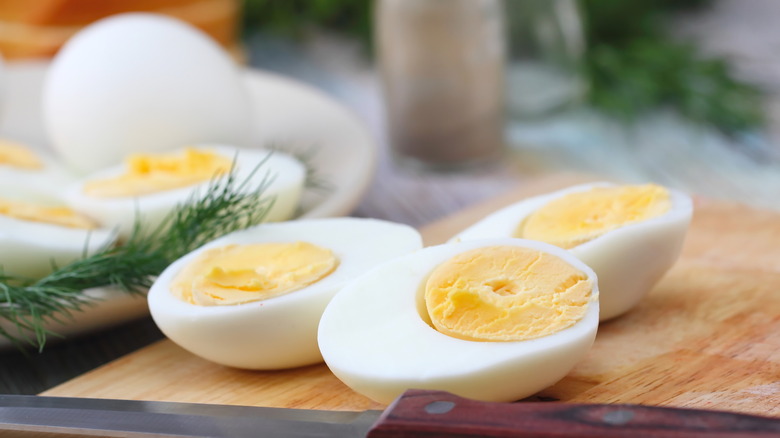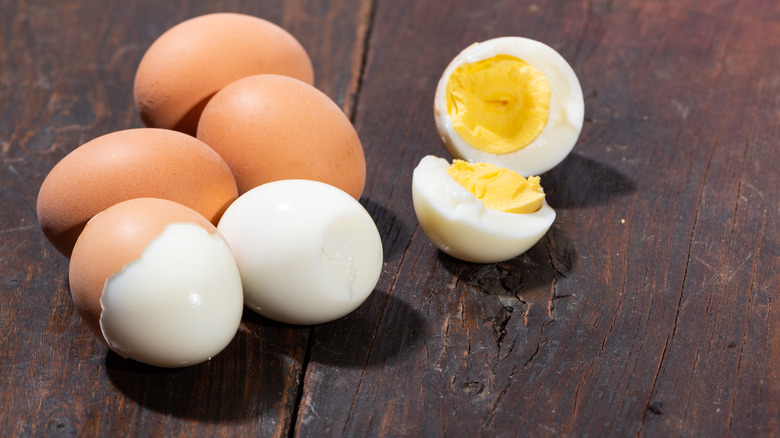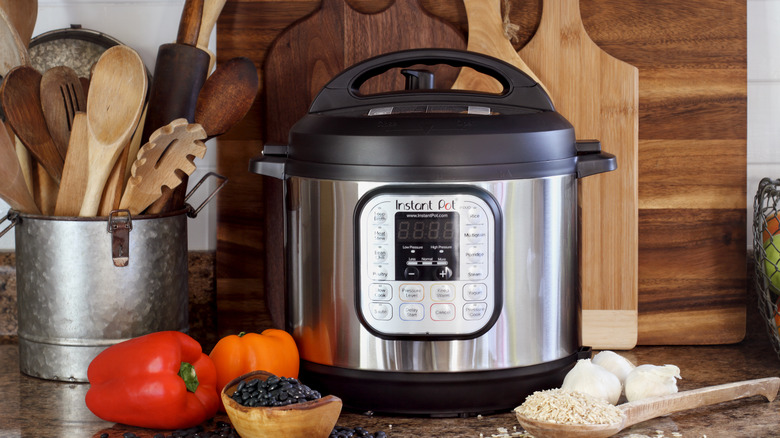How Do Oven-Cooked Hard Boiled Eggs Compare To Traditionally-Boiled Ones?
You've seen a hard-boiled egg before. Maybe it's at a dinner party in the form of a deviled egg? Maybe you see someone coloring them in pastels for Easter. You might have seen someone order them for breakfast or on top of their salad. No matter where you saw it, you know what a hard-boiled egg is.
If you've seen a hard-boiled egg, then you at least have some idea of how the egg is prepared. The egg is boiled in hot water until the inside is cooked and the yolk is set, then the shell is peeled off and the egg can be consumed as a whole or cut apart. Boiled eggs aren't a modern invention by any means, dating back centuries as far back as ancient Rome, where a version of what we call deviled eggs was served as appetizers. The simple method of boiling an egg in a pot of water has been practiced in many homes and restaurants across the world and is so common a practice that one would almost think it was the only way to boil an egg — almost.
Some speculate that it is possible to use your oven, not just your stovetop, to boil eggs. If this is possible, what exactly are the differences between an egg boiled on the stove and an egg baked in the oven? The answer, you'll discover, actually makes little difference, with the only real contrast being how firm you like your hard-boiled eggs.
Oven-baked eggs have a softer texture
The method of baking an egg in the oven differs somewhat slightly from boiling an egg. Rather than boiling the egg in a large pot of water, the process involves laying your eggs in a baking dish or muffin tin and then baking them for thirty minutes at 325 degrees Fahrenheit. The eggs are then quickly dunked into an ice water bath, which stops the cooking process by "shocking" the eggs. Once the eggs are cool, you can then peel and serve the eggs in the same way you serve regular boiled eggs.
What's the difference between the two methods? Not much, honestly. Oven-baked eggs and hard-boiled eggs supposedly taste almost exactly the same, with any difference being so subtle that it's negligible. The main difference is that the texture of the whites of the oven-baked eggs is somewhat softer than those boiled on the stovetop, while the whites of the eggs boiled the traditional way have a comparatively firmer texture. Aside from that, everything else — including the yolk, which should still remain a firm yellow "ball" — will still remain almost exactly the same.
A bonus of baking your eggs in the oven rather than straight boiling them is that you can prepare large amounts of "boiled" eggs at once without worrying the eggs may crack or break during the cooking process. If you prefer boiling your eggs on the stovetop, that's also a perfectly acceptable method.
You can also make hard-boiled eggs in an Instant Pot
You're probably heard about or seen the Instant Pot before on TV, in magazines, or even on this website. In short, the Instant Pot is a pressure cooker, slow cooker, and rice cooker all in one machine. While undoubtedly very versatile, you may not have known that the Instant Pot is surprisingly good at boiling your eggs.
To use this "hidden feature" of the Instant Pot, put the eggs you want to boil into a steamer basket and then seal the basket inside the pressure cooker along with at least a cup of water. It may take five to ten minutes for your Instant Pot to fully pressurize and "cook" the eggs, but it's suggested that you wait five minutes while that pressure releases following the cooking process. The whole process takes about ten to fifteen minutes to fully boil the eggs– much shorter than the usual traditional or oven method.
The only flaw that seems prominent with this method is that the eggshells tend to crack apart when the pressure is released. While the inside of the egg won't be harmed, you may not like picking bits of eggshell from the Instant Pot when the eggs are done cooking. However, since another bonus of the Instant Pot method is that the shells are much easier to remove, you may not particularly care about any unsightly cracks in your hard-boiled eggs.


